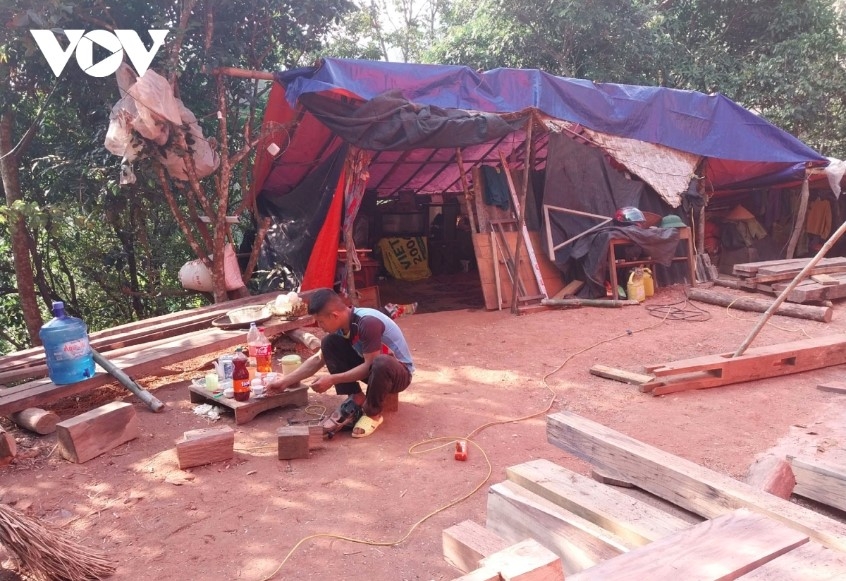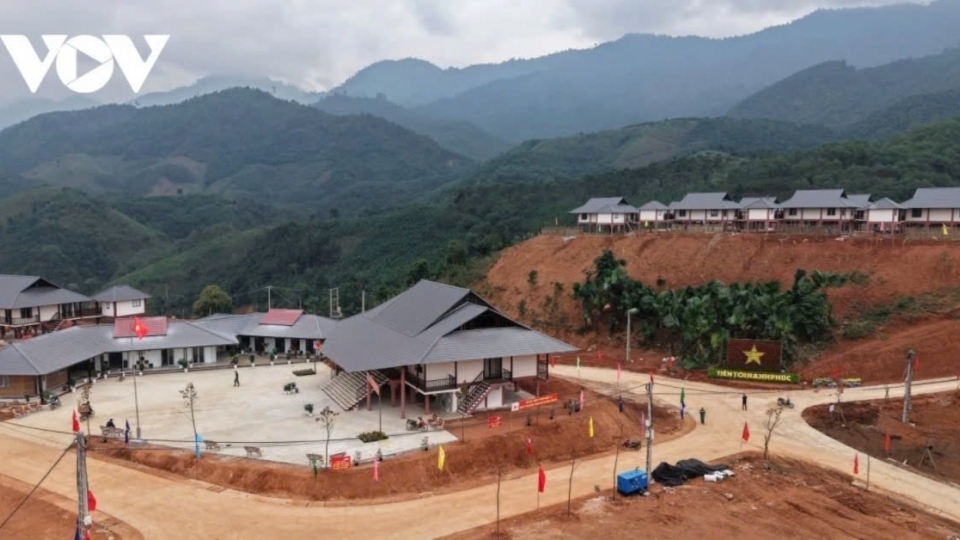Fast-tracking efforts to end makeshift housing by 2025
VOV.VN - Eliminating makeshift and dilapidated houses is both a social policy and a sustainable development strategy for Vietnam, requiring strong determination and combined efforts to achieve the 2025 goal in a spirit of mutual support and solidarity.

According to the latest data from the Ministry of Labor, Invalids and Social Affairs, as of February 7, 58 localities had established provincial-level steering committees for eliminating makeshift and dilapidated houses.
Five other localities, including Hanoi, Hai Phong, Quang Ninh, Vinh Phuc, and Ba Ria Vung Tau did not form committees as they no longer have such houses.
At the same time, the country has provided support to eliminate 100,637 makeshift and dilapidated houses. Among them, 59,871 houses have been completed, an increase of 11,985, while 40,766 new houses have been initiated, up by 1,445.
However, approximately 315,000 households still face housing difficulties. These include families of people with meritorious services, those under targeted programs, and poor or near-poor households.
They require support to secure safe and stable housing, enabling them to settle down, focus on work and economic development, gradually escape poverty, and contribute to poverty reduction and social welfare goals. To achieve this target by 2025, localities must step up efforts with a clear roadmap.
Dr. Nguyen Minh Phong, former head of the economic research division at the Hanoi Institute for Socio-Economic Development Studies, emphasized that eliminating makeshift and dilapidated houses is not an insurmountable challenge. He pointed out that significant financial resources recovered from anti-corruption efforts, pandemic response, and social mobilization initiatives could be redirected to this cause.
Fulfilling the central government's directive to eliminate over 300,000 such houses by 2025 will require stronger political commitment and well-defined mechanisms.
The government must assign specific responsibilities to localities and relevant ministries to develop detailed plans. Each locality must assess the number of houses in need, outline financial solutions, establish timelines, assign clear accountability, and determine implementation mechanisms.
According to Dr. Phong, eliminating makeshift and dilapidated houses should be seen as a heartfelt mission that must be carried out decisively and urgently. All actions must be approved by competent authorities, continuously monitored, and updated. This initiative should be a top priority in 2025, closely linked to performance evaluations of officials involved.
"With determination and a well-structured implementation plan, I am confident that this goal can be achieved within the year. However, responsibilities, outcomes, deadlines, and specific tasks must be clearly defined. Alongside government-led efforts, private sector involvement should be incentivized. Organizations, philanthropists, and individuals willing to contribute should be supported in understanding, planning, and collaborating on this initiative," Dr. Phong stated.
Highlighting the favorable conditions for achieving this goal in 2025, he noted that economic conditions have improved compared to 2024. Administrative streamlining and the nation's drive for progress have generated strong momentum. Authorities should leverage these factors to assign responsibilities and encourage proactive participation.
Recently, the government asked the Vietnam Bank for Social Policies to increase support for housing assistance. The subsidy for newly built houses has risen from US$50 million to US$60 million per unit, while the amount for house repairs has increased from US$25 million to US$30 million. This demonstrates a more flexible disbursement policy. The government should further expand social mobilization efforts, streamline procedures, and facilitate direct connections between beneficiaries and support programs to minimize intermediaries and inefficiencies.
Dr. Bui Sy Loi, former deputy chairman of the National Assembly’s Committee on Social Affairs, underscored the importance of nationwide mobilization led by the Party, State, and Vietnam Fatherland Front to deal with housing difficulties, especially in remote, mountainous, border, and island areas. Without adequate housing, poverty remains a stark reality for affected communities. The program to eliminate makeshift and dilapidated houses holds tremendous significance in ensuring long-term social welfare.
"This policy is a strategic decision by the Party and the State, marking a step toward a new era where no one is left behind. It is a crucial milestone in building an inclusive and prosperous nation where all citizens have access to stable housing. If successfully implemented in 2025, this initiative will provide people with a secure foundation to thrive, spurring national development and ensuring a prosperous and fulfilling life for all," Dr. Loi affirmed.
To maximize the program’s effectiveness and support national progress, he stressed the need for broad consensus and coordination across the political system. Encouraging compassion, solidarity, and collective action is essential. With nationwide unity and determination, this policy will yield practical results. Given Vietnam’s deep-rooted tradition of mutual support and humanitarian values, the goal of eliminating makeshift and dilapidated houses in 2025 is entirely achievable.



